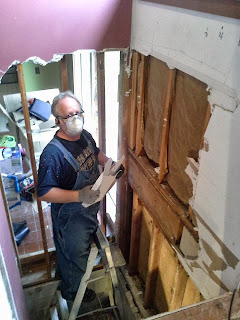My husband worked in corporate America trapped in a cubicle
for more than twenty years, and for another five divided his time between a
desk facing a wall at home and a windowless office in a massive building. (My home office looked across the street to a small orchard and Betsy, the neighbor's cow.)
Now, though, in our self-employment venture, Kevin's office
looks out on the waters south of Agate Passage in Puget Sound. He has stationed a table, printer, and his laptop computer in the upper room of the house
we are remodeling to sell, and has been spending his days at the new home office since
August.
He can tell you how high the tide is within six inches, at
what depth the large rock off the shore will be submerged, how this translates
to the water level against the bulkhead, and how the sounds we can hear of
water slapping against wood vary with the tide. He watches the inland sea
expand and contract each day, the sunset go pink over the water and the moonrise
over Bainbridge Island, and catches the top of Mt. Rainier on clear days.
Each day he watches clouds and fog roll and lift and birds
fly and float: seagulls that flock by, blue herons who fish from the shore and
perch on the large rock, cormorants who roost all day on a floating dock a few
hundred yards north, spreading their wings like bats for minutes at a time when
they need (I speculate here) personal space, and with some regularity, bald
eagles gliding by.
I don’t work at the project house often, we’ve hired
professionals and laborers as befits a business, but I’ve spent time there
kayaking, picnicking, spending the night by the beach twice, visioning with
Kevin and offering my opinion on the latest plans, and gardening.
I’ve spent a lot of time there this last week, picking
sticks and plant debris out of the hillside, cutting off dead branches of
native salal, and trying to remove the roots of Himalayan blackberry (curse you
Himalayan blackberry). The eagles have been out. One afternoon I kept hearing
lots of distinctive chatter, and dropped what I was doing to scan the sky, but
couldn’t quite locate it. Finally I saw the eagle fly by with a soft cedar tip
in its talons. I guessed it was building a nest.
Kevin tells me that my entire demeanor changes when I hear
an eagle, and it’s true. I enter a state of heightened awareness, listening
intently, looking up and up and around, and evidently my jaw drops and my eyes
sparkle and I’m alight. When Kevin’s nearby, I call to him, “Bald eagle,” and he
lopes out of the house, down the hill to where I am, looking at the sky.
Yesterday, Kevin, who has been working outside near the
water, saw two eagles making their presence very visible, taking over the
cormorants’ dock, flying together over the neighborhood. He phoned me with an
eagle report; he is as rapt as I am, and I am glad we are delighting in this
together. I don’t know if we’d feel the same if we were born and raised here,
but we weren’t and I pray that the novelty never wears off. (Watch a video of the eagles.)
I think we have a mating pair in the neighborhood
establishing a new nest, and today I heard the telltale cry and looked up to
see a bald eagle flapping furiously in pursuit of a seagull. The eagle caught
the gull in its talons and plummeted to the water. As they hit the surface, the
gull broke free, but for long minutes, the eagle continued to chase it. I
called to Kevin and together we gaped at something akin to silent aerial road
rage. It was fascinating and a bit frightening. Finally, the eagle, energy
spent, returned to a tree out of sight, and the gull dropped to the water,
bobbing peacefully.
I returned my attention to gardening, thankful that I’d
looked up. An hour later I watched a seagull in the shallows dive to the bottom three times, catch a crab, walk to shore, and eat it one bite (and I thought they only mooched French fries at the Santa Cruz Beach Boardwalk).
I think about the
people we will sell this house to, and I hope that they too, will drop whatever
tasks occupy them to witness the wildlife dramas in their midst. There is
something transformative about working in this environment, the intricacies of
nature played out before us instead of in a Nature documentary that shifts our
manual labors from work to gift.
There must be moments when my husband wonders how he fell so
far off the corporate ladder, and I too have fleeting thoughts of a time when I
was recognized in town and respected by the church and its elders. Our circles
now are so much smaller, some days encompassing only the two of us plus our
cats.


















